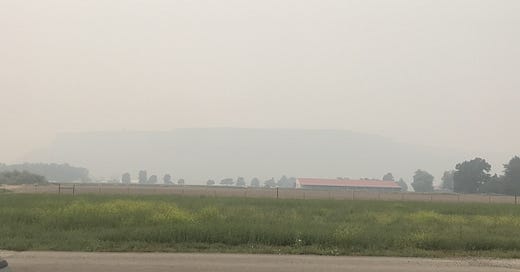Summer: the new normal of fire and smoke.
Tipping points. A little difference has a big effect.
Summers in Southern Oregon used to be my favorite time. It is different now. Smoke.
I used to think that a two to four degree rise in world temperatures would simply be an up-shift of the temperature gradients. Americans could think of a town 100 to 150 miles south and imagine living there. I misunderstood tipping points.
Hurricane Ida that bashed New Orleans is in the news. Hurricanes happen when the water is 80 degrees or higher, when the humidity is high, and when there is limited "wind shear" in the column of air to interrupt the vertical flow of moist air. Rising moist air, creates a giant cyclone.
When the temperature is 79 we don't get hurricanes, but at 80 we do. When the water is 82, the velocity of the moist evaporating air is much faster than at 80, and the hurricanes are monsters. At 85 degrees, the hurricanes are giant monsters. In New Orleans those degrees are the difference between a lazy, sultry summer afternoon and roofs being blown off houses.
Southern Oregon's summers are experiencing our own climate monster. The smoke isn't an event. Now it is chronic.
The dominant weather feature has changed, from temperature to smoke. Most days this summer have had chokingly bad air, with the AQI--the Air Quality Index--somewhere between Unhealthy and Hazardous, from 100 to 400 by the numbers, with 10 to 30 times the fine particulates the health authorities say is healthy. An AQI of 150+ is like being downwind from a campfire.
The hotter temperatures are resulting in lower precipitation from the storms coming off the Pacific in the wet winter months--meaning less water in the reservoirs. More critically, it means that the months of spring precipitation when normally the grass stays bright green, are becoming rain-free, like always-dry July and August. Now we have dried-out vegetation combined with the hot temperatures of mid-summer. This changes everything about wildfires here.
The primary result of warmer climate is not experienced by me as pleasant shirtsleeve weather in March. It is experienced as choking smoke from July until the rains start in November. It is our version of roofs blowing off.
There is plenty of finger-pointing politically. One school of thought is that if we just harvested more trees for lumber production we would have less fuel in the forest to burn. That is the voice of Republicans generally. Another school of thought is that if we just did a better job of managing and thinning forests of non-commercial brush there would be less to burn--the voice of Democrats generally.
I have a different observation, drawn in part from the fire last year that burned up over 2,000 homes along an urban strip of land next to a creekside wild area--the Greenway. It wasn't managed or mis-managed federal timberland. It was a park, backed right up to urban developments, inside city limits. It is the same as the natural areas on my farm. Much of it is bone dry--by June.
The problem is only partially forest management. Everyone agrees we could do more and better. The nature of our land and climate here is that there will be forestland. Winter rains will grow trees, and if not conifers then broadleaf, and if not big trees then brush. If the vegetation is dry by June, with the hottest days still to come, we will have fires. Monster fires. Careless people or lightning will ignite them.
There is political consensus in Southern Oregon that the smoke is intolerable. Politicians must do something! There is no consensus on what to do nor is there consensus on why the spring rains aren't coming. There isn't consensus on whether the planet is really warmer than it was before, nor is there consensus on whether humans are causing the temperature to rise. Most of my readers think it is obviously human-caused, but there are doubters and deniers, and they represent about half of the American population, and they vote.
Little additions to the temperature can be the tipping point for life-changing consequences via hurricanes in New Orleans or forest fires here. That is how climate change shows up.
Humans will be slow to admit we are causing it. Creative people--artist, poets, writers--put ideas into the cultural environment that allow citizens to accept as plausible something we resist because it requires change and sacrifice. It may take centuries. In 1818 Mary Shelley created a fictional monster we call Frankenstein. A doctor was experimenting with something with consequences far greater than he understood. We give the name Frankenstein to the monster, but he was the creation of Doctor. Frankenstein, a human.







